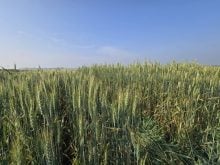Concerns about a troublesome policy and regulatory environment, extreme weather and trade barriers keep Canadian agriculture professionals awake at night.
Why it matters: Many within Canada’s agriculture sector think the country lacks an industry-wide strategic approach to overcome chronic and complex problems.
That’s according to a joint report from the Canadian Agri-Food Policy Institute (CAPI) and the University of Saskatchewan’s Global Institute for Food Security on risks in Canada’s agrifood system. The report provides results from the first phase of research by the groups, which aim to develop policy recommendations for issues in the agriculture sector.
Read Also

KAP flags risky trade for Manitoba farmers
Tariffs, market access uncertainty, trade diversification and export infrastructure top the agenda at Keystone Agricultural Producers (KAP) annual meeting.
The first phase included a survey of more than 500 farmers, food processors, government personnel and other agricultural stakeholders on what they’re most concerned about, and what issues should be given priority.
Problems are long-term
Respondents largely indicated policy, extreme weather and trade problems were already a reality, and that such problems are perceived to be both chronic and complex. As the report summary details, fewer than 15 per cent of respondents “have confidence in government to solve any of the three, while fewer than 22 per cent say they have confidence in private sector solutions. Thus, the uphill battle will evidently persist for years to come.”
Tyler McCann, CAPI’s managing director, says the survey gathered perspectives from a good cross-section of farmers, society, government and industry professionals. While the top concerns were not a surprise, McCann was intrigued by what appears to be widespread resignation.
“We see policy, extreme weather and trade as already being a problem, even a difficult or extreme problem, but we seem to think there’s little we can do about it,” he says.
“It’s hard to wrap your mind around that. It’s one thing to say we’re not sure what we’re going to do about extreme weather … but on the domestic policy front, that is within our control.”
McCann adds that while people generally think Canada is ahead of many other countries on social and environmental issues, only about 30 per cent think it is ahead economically. This suggests governments must focus attention on economics and better communicate with the agricultural industry about Canada’s economic position.
Optimism and priorities
Despite some resignation, 62 per cent of respondents expressed general optimism about the direction of Canadian agriculture. The report said that optimism stems in part from the perspective that Canada is well positioned, or at least fairly well positioned, to “take advantage of burgeoning markets.”
By comparison, 21 per cent of respondents said they are pessimistic. Higher levels of pessimism were identified in respondents from rural or remote areas, suggesting farmers comprised much of the category.
Another take-away for McCann was overlap between what respondents thought governments and private industry should focus on to improve the sector.
While research and development were rated as a higher priority for the private sector, for example, it was also identified as a priority for government. McCann says this highlights the opportunity for greater investment and cooperation across the industry, which is much needed given the sector’s general habit of operating in silos.
The report itself says “the preference for a focus on innovation and productivity is evident across different facets of the agriculture sector. Notably, farmers show the least preference for any one aspect of this, suggesting a wide diversity of opinion.”
McCann says his organization and the Canadian Global Institute for Food Security intend to produce a “second-phase” report that further analyzes these issues and recommends “what to do about it.”
“The core belief is we need a more ambitious strategic policy solution in this country,” he says. “We want to develop how we take these concerns and bring them to life. We see the risks the sector faces as a space where we need more focused action, and need to work together more.”















